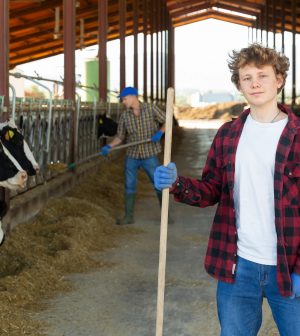- Could Your Grocery Store Meat Be Causing Recurring UTIs?
- Are You Making This Expensive Thermostat Error This Winter?
- Recognizing the Signs of Hypothyroidism
- 10 Strategies to Overcome Insomnia
- Could Artificial Sweeteners Be Aging the Brain Faster?
- Techniques for Soothing Your Nervous System
- Does the Water in Your House Smell Funny? Here’s Why
- Can a Daily Dose of Apple Cider Vinegar Actually Aid Weight Loss?
- 6 Health Beverages That Can Actually Spike Your Blood Sugar
- Treatment Options for Social Anxiety Disorder
Stress that Farm Families Face Affects Parents, Kids Alike

While the challenges of farm work are well noted, the stressors affect not just the mental health of adults, but also their teenage children, according to new research.
In results from the first year of a five-year study, researchers found that 60% of both adults and teens on U.S. farms met the criteria for at least mild depression. About 55% of the adults and 45% of the teenagers had symptoms of generalized anxiety disorder.
“There’s a lot of young people growing up on a farm and participating in agricultural work. We’ve long acknowledged the inherent hazards of this work environment, and now we’re also recognizing its impact on mental health,” said researcher Josie Rudolphi, Illinois Extension specialist and assistant professor in the College of Agricultural, Consumer and Environmental Sciences at the University of Illinois Urbana-Champaign.
“Most of the work on farm stress and mental health is primarily focused on adult farmers. However, it is important to recognize that children are fully aware of what’s happening on the farm, and they are not immune to the stressors that exist,” Rudolphi said in a university news release.
The researchers gathered data through online surveys of farmers and their children ages 13 to 18 throughout the United States. They used something called the Family Stress Model, developed in Iowa in the 1990s as a way to look at economic stressors and mental health in farmers.
“Prevalence of depression in the general population is typically around 17 to 18%, so these numbers are quite high,” Rudolphi said. “Although we don’t have a control group for direct comparison, we used similar instruments to screen for mental health conditions as national public health surveys. Additionally, these statistics are not unusually high for a farm sample, based on previous surveys with farmers.”
Farm debt was closely correlated with a depressed mood in adults. This was, in turn, correlated with teenage depression and anxiety.
“It’s not unexpected for children to be affected by the experiences of adults. In many other settings, adults can leave work, return home, and transition into their roles as parents. But in a farm environment, the boardroom table is the kitchen table, and there is talk about farm activity in the household. There’s a blur between work and family, or business and residence, so it becomes rather complicated,” Rudolphi said.
Despite the findings on symptoms of depression or anxiety, about 82% of the family members surveyed still rated their own mental health as excellent or good.
Rudolphi said this may suggest that these respondents have become accustomed to living with mild or moderate depression. They see it as normal.
Among the most important findings is the strong correlation between adult depression and teen depression, Rudolphi said. She noted the need to develop resources and services for the entire farm family.
“The agricultural environment prides itself on looking out for one another. We should harness that shared responsibility to foster a sense of community and support for young people. This involves engaging with rural schools, teachers, coaches and agricultural youth leaders in mental health awareness initiatives,” Rudolphi said.
The findings were published in Frontiers in Public Health. The research was funded by the National Children’s Center for Rural and Agricultural Health and Safety.
More information
Texas A&M University has more on managing farm life and depression.
SOURCE: University of Illinois Urbana-Champaign, news release, June 12, 2023
Source: HealthDay
Copyright © 2026 HealthDay. All rights reserved.










